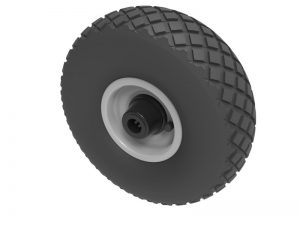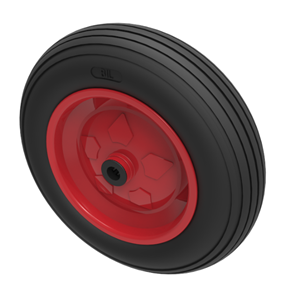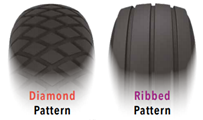£0.00
0Pneumatic v Puncture Proof Tyres
There is a lot of science that goes into the tyres that we fit to the wheels on our castors and sack trucks although this may not be immediately apparent. However it soon becomes evident to the person who is using the sack truck or trolley and so making the correct decision of whether to use a pneumatic or puncture proof tyre is vitally important.
Essentially both do the same job, but how they do it varies considerably and it is possibly easiest to think of riding a bicycle. Pneumatic tyres offer a smooth ride, capable of cushioning bumps in the ground and generally take less effort to get from one place to the next.
Against this is the possibility of the tyre going flat with a puncture or at least losing pressure when standing idle for a long time and the hassle of having to repair or pump it up before you can use the bike.
Puncture proof tyres on the other hand don’t suffer from going flat and are always ready to use but they tend to take more effort and are less able to deal with soft or rough ground, transmitting every bump you go over and prone to getting stuck in the mud.
So choosing which one is best really depends on the application of the unit they are fitted to.

Pneumatic Tyres
BIL pneumatic tyres are air filled and are therefore ideal for use on testing surfaces which are common in construction and industrial settings, particularly outdoors. They are also capable of supporting higher loads with individual wheel capacities ranging from 75 – 350kg. The PLY rating refers to the strength of the tyre and the higher the rating, the stronger the wheel. BIL pneumatic tyres are supplied with PLY ratings of 4 and 6 making them a very durable and cost effective choice.
Being air filled, this also allows the pressure to be adjusted for improve manoeuvrability, thereby increasing the flexibility of applications where a pneumatic tyre is fitted to the equipment.

Puncture Proof Tyres
These are solid tyres manufactured using micro-cellular polyurethane which is pressed onto the rim using our special machinery. They are typically ideal for smoother, solid surfaces such as warehouses and where there is the risk of puncture from debris and sharp objects. BIL only uses the highest grade polyurethane which is tried and tested to give minimum compression and to minimise the risk of flat spotting.
A further consideration is the density of the foam used as a higher density gives greater load capacity. It will also affect the tyre deformation under load which can make a sack truck or trolley either easy or back breaking to move!
Fortunately BIL offers both low and high density options for the majority of the range with load capacities ranging from 75 – 200kg per wheel. View our puncture-proof wheels here
Tread Pattern
BIL mainly supply pneumatic and puncture proof tyres with either a ribbed or diamond tread pattern, each having it’s own particular benefit and just like a bicycle tyre there is a trade off between grip and rolling resistance.

Road racers will favour a tyre with a ribbed tread pattern as these have less friction and therefore require less energy, although they can be tricky on slippery or loose surfaces. Mountain bikers on the other hand need plenty of grip and choose tyres with a diamond pattern to cut through the mud. These require more effort but make the bike safer to ride over short distances.
Like we say, there is quite a lot of science in the tyres we supply and we would recommend a full review of where and how the unit they are fitted to is going to be used as this may make a huge difference to the efficiency of the equipment and the well being of those using it.
To view the range of pneumatic and puncture proof wheels available for BIL, along with the many other varieties supplied by the company please visit the ‘Wheels’ section of our Castors & Wheels website or download our brochure here. Alternatively talk to us and we will be happy to advise on the best option for your requirements.
